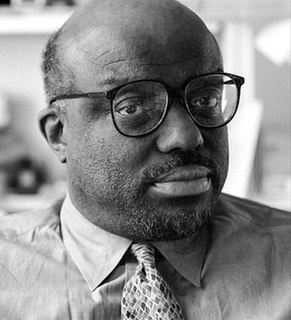Top 38 Quotes & Sayings by Stanley Crouch
Explore popular quotes and sayings by an American novelist Stanley Crouch.
Last updated on April 15, 2025.
The extent of his influence across jazz, across American music, and around the world has such continuing stature that he is one of the few who can easily be mentioned with Stravinsky, Picasso and Joyce. His life was the embodiment of one who moves from rags to riches, from anonymity to internationally imitated innovator. Louis Daniel Armstrong supplied revolutionary language that took on such pervasiveness that it became commonplace, like the light bulb, the airplane, the telephone.
Above all else, [Benny Goodman] was a great player, one of the greatest American music has produced. He brought his absolute talent and his invincible love of music to the fore every time he played. There are many other things connected to society and ethnicity that are often mentioned in a discussion of Benny Goodman but all of them are connected to his overwhelming affection for the art of the music and the fairness it should be allowed to express.























